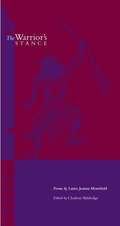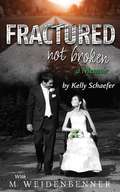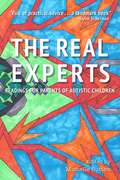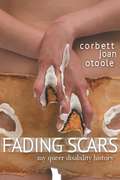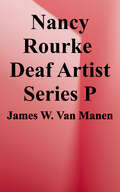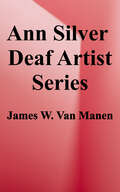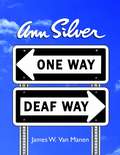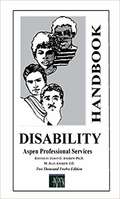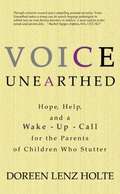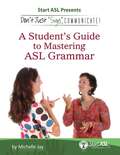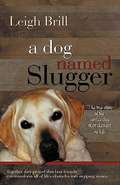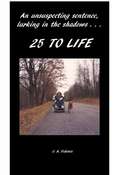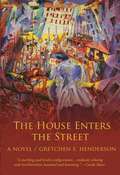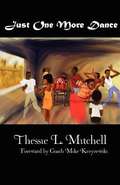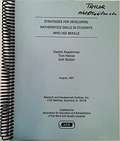- Table View
- List View
Assistive Technology Solutions in Minutes, Book 2: Ordinary Items, Extraordinary Solutions
by Therese WillkommAssistive technology "MacGyver" Therese Willkomm, Ph.D., returns with her second book of five-minute, low-cost approaches for taking ordinary items and turning them into extraordinary solutions for individuals with disabilities. Picking up where the first book left off, AT Solutions in Minutes II demonstrates creative DIY problem solving without the need for power tools or electricity, empowering everyone to be spontaneous and create solutions to everyday challenges using everyday materials. T Every solution can be made using simple and readily-available tools like a utility knife, pliers, scissors, a wire stripper, and a mini blowtorch, among others. Thanks to a grant from the Gibney Foundation, one hundred percent of the proceeds from this book will fund assistive technology devices for New Hampshire's device loan and demonstrations provided through ATinNH, New Hampshire's assistive technology program at the University of New Hampshire's Institute on Disability.
The Warrior's Stance
by Laura MorefieldA collection of poems, which includes: I Invented Body Surfing, I Am Not My Cancer, Another Day, Waiting, Gift From A Long Dead Brother, And I Thank You For The Grace, and more. An inspiring, short collection.
An Archaeology of Yearning
by Bruce MillsDigging into vivid moments within the metaphor of archaeology, Bruce Mill's remarkable memoir maps the artifacts of life as a father of a boy with autism, and as a boy himself growing up in rural Iowa. An Archaeology of Yearning is not ultimately about autism; instead it reaches into the world of human connection and illuminates how storytelling and an understanding of language keep that connection alive.On some nights, I awake as if in a cave and think of the future. Mary and I will exist as memories: a quick glimpse of arms reaching toward another's shoulders or face, an image of a hand upon a book, the scent of our bodies after the sweat of sleep, the tone of our young and old voices calling our daughter or son from distant rooms or down a stair.Eventually I arrive on the image of my son, in some new home. No matter how much I have written or catalogued or kept in images, I know that the site of his life and mine will inevitably remain fragments and that only a visitor can bring us to life.Bruce Mills has published scholarly books and articles on nineteenth-century American writings and co-edited a collection of essays by siblings of those on the autism spectrum. His creative nonfiction has appeared in The Georgia Review and New England Review. He teaches in the English Department at Kalamazoo College.
I'm Starting To Walk - I Can Use A Cane!: Introducing Orientation And Mobility Skills To Very Young Children Who Are Blind Or Have Low Vision
by Bronwen ScottThis booklet describes techniques used by the author to introduce orientation and mobility (O&M) skills to very young children who are blind or have low vision. Skills covered include guiding, independent travel skills, early introduction of the long cane and the promotion of independence.
Fractured not Broken, A Memoir
by Kelly Schaefer M. WeidenbennerFractured Not Broken is a true story of loss, faith, and a rare love that only happens in nonfiction.In a sweeping and heart-wrenching narrative, Kelly exposes the truth about what happened after a drunk driver rendered her a quadriplegic. She shares how she found her way back--through faith and pain, her community, her family, and the love of a man she prayed for.
The Real Experts: Readings for Parents of Autistic Children
by Michelle SuttonListening to the insights and experiences shared by autistic bloggers has helped Michelle Sutton to help her two autistic children to thrive. Now, Michelle has collected writings from a dozen autistic authors. The result is an extraordinary resource for families with autistic children, and also for educators, therapists, and other professionals.
Fading Scars: My Queer Disability History
by Corbett Joan OtooleUncovering stories about disability history and life, OToole shares her firsthand account of some of the most dramatic events in Disability History, and gives voice to those too often yet left out. From the 504 Sit-in and the founding of the Center for Independent Living in Berkeley, to the Disability Forum at the International Woman's Conference in Beijing; through dancing, sports, queer disability organizing and being a disabled parent, OToole explores her own and the disability community's power and privilege with humor, insight and honest observations.<P><P> "Corbett Joan OToole's Fading Scars: My Queer Disabled History is like a song-an anthem, a lullaby, a ballad, a love lyric and a chant all at once. This book of essays chronicles one person's life, but also the 40 years that disability rights and disability justice shaped American history. Its first-person accounts of historical events, fierce focus on disabled identities, and consistently accessible language and structure make it unusual-perhaps even unique-among disability memoirs. Bursting with ideas, stories, and arguments, Fading Scars is a book in which experience accrues into knowledge and emerges through the written word as wisdom. Fading Scars combines razor-sharp organization with passages of lyrical beauty. It establishes a new standard, perhaps even the beginning of a new aesthetic, for disability writing." - Margaret Price, author of Mad at School: Rhetorics of Mental Disability and Academic Life.<P> "Illuminating disability history with clear and funny stories, this book builds a home where those of us who have lived on the sidelines can seek shelter." - Naomi Ortiz, Writer, Artist and Disability Justice Activist<P> "Fading Scars is a must read for those interested in disability community, activism, and scholarship." - Kim Nielsen, author of A Disability History of the United States (ReVisioning American History)
Nancy Rourke (Deaf Artist Series)
by James W. Van ManenNancy Rourke: Deaf Artist Series by Empyreal Press (empyrealpress.com), is the first book ever published about Nancy Rourke, a Deaf oil painter who works in the De’VIA (Deaf View Image Art) genre. <p><p>Its pages are filled with vibrant images in Rourke’s trademark primary colors, along with descriptions of art and biography. Rourke’s affinity for art dates to her childhood, when she started drawing as a means to communicate with her parents. Though she has created art for over forty years, Rourke’s present style evolved in 2010 when her artwork began reflecting the Deaf View/Image Art (De’VIA) themes of affirmation, resistance and liberation. <p><p>In the book, Van Manen not only explains the origins of Rourke's paintings, but also accounts for her remarkable success as an artist in the years since adopting De’VIA themes. Nancy Rourke: Deaf Artist Series is a wonderful educational resource for art enthusiasts, and for aspiring artists, and for people interested in Deaf Culture or De’VIA art. <p><p>This series brings attention to the artwork and lives of contemporary Deaf visual artists who are important to the Deaf Art Movement and De’VIA (Deaf View / Image Art). These are Deaf artists who place a perspective on their artwork which relates to American Sign Language, Deaf heritage and Deaf culture. Each book contains biography, art interpretation and some art description. The availability of this important series offers readers an insight into the world of culturally Deaf people through their artists. Furthermore, the series serves as a useful guide for art historians, curators, and docents in recognizing Deaf Art/De’VIA’s contribution to American art.
Ann Silver (Deaf Artist Series)
by James W. Van ManenAnn Silver: Deaf Artist Series by Empyreal Press (empyrealpress.com), is about Ann Silver, a Deaf Pop artist who works in the Deaf Art/De’VIA (Deaf View/Image Art) genre. Its pages are filled with vibrant images of Silver’s compelling artwork, along with descriptions of art and biography. <p><p>While barely 20 and an undergraduate, along with a few others, she started the Deaf Art Movement. The book includes a timeline of the Deaf Art Movement (DAM) from 1968-1989 and gives compelling evidence of the strong foundation that the DAM created for the small group that created the De’VIA Manifesto in 1989. She has been involved in many types of artwork, so many that some readers may think the book is about several artists. Indeed, the majority of the artwork in the book was created by her. <p><p>This book is an art biography because it is about her art, but it is also about her life. It reads in chronological format, starting with her birth and leads the reader through various stages in her life and artwork up to the present. <p><p>Ann Silver: Deaf Artist Series is a wonderful educational resource for art enthusiasts, and for aspiring artists, and for people interested in Deaf Culture or Deaf Art / De’VIA art. This series brings attention to the artwork and lives of contemporary Deaf visual artists who are important to the Deaf Art Movement and De’VIA (Deaf View / Image Art). These are Deaf artists who place a perspective on their artwork which relates to American Sign Language, Deaf heritage and Deaf culture. Each book contains biography, art interpretation and some art description. The availability of this important series offers readers an insight into the world of culturally Deaf people through their artists.
One Way, Deaf Way
by James W. Van Manen Ann SilverTo say that Ann Silver is a remarkable person is to miss the mark. While barely 20 years old Ann Silver along with a few others started the Deaf Art Movement. By age 40 she had created an international symbol of sign language interpreting and had her design work published on over 2000 book covers. Five years later after rededicating her life to studio art Silver had completed over 150 pieces and defined a new art genre Deaf Pop Art. This book leads the reader through the life and art of this incredible Deaf artist.
Medical, Psychosocial And Vocational Aspects Of Disability
by Martin Brodwin John Howard Frances Siu Erin Brodwin Ashley DuMedical, Psychosocial and Vocational Aspects of Disability (4th Ed. )
Rehabilitation Consultant's Handbook
by Roger O. Weed Timothy F. FieldThe Rehabilitation Consultants Handbook is completely updated with fresh ideas, illustrations and references. A must resource for the present rehabilitation professional, the Handbook covers important topics such as: case preparation, expert work, transferability, labor market access, life care planning, lost earning capacity, and much more. The appendices are loaded with vital references and data that will serve the professional as a primary source of information in future case development. This resource has been revised and updated over the last 18 years and has become a standard reference for private sector rehabilitation.
Voice Unearthed: Hope, Help and a Wake-up Call for the Parents of Children Who Stutter
by Doreen Lenz HolteThe primary message young children get in stuttering therapy is that they can and should manage their speech - in other words, try to not stutter - by utilizing speech tools and techniques. Is it possible that the anxiety this causes can create an even greater burden? Can that burden lead to excessive silence and disengagement - a far greater handicap than the stuttering itself? <P><P> Through personal narrative and extensive research, Voice Unearthed answers these questions with a resounding “yes!” It also includes practical guidance that helps keep children talking while minimizing everyone’s anxiety around communicating. <P><P> Voice Unearthed frees us from the pointless, painful chore of counting speech errors and reminds us to keep our eyes on what truly matters. It’s also a wake-up call for parents, professionals, and the entire field of speech therapy – and a reminder to “first do no harm.”
Don't Just Sign... Communicate!: A Student's Guide to Mastering ASL Grammar
by Michelle JayAre You Making Common Signing Errors? <p><p>Make no mistake about it... when venturing into the world of American Sign Language, the first thing you must understand is that ASL is its own language. It is different from English. ASL is also not like other Signing Systems. <p><p>Like any other Language, ASL contains its own unique rules of syntax, phonology, grammar, etc. To become fluent in the ASL language, you must first be armed with these essential rules and terminology. <p><p>Don't Just "Sign"... Communicate! methodically takes you, step-by-step, through the essentials of ASL Grammar to prepare you to truly and effectively communicate in and understand ASL. <p><p>This carefully outlined guide not only illustrates the importance of understanding ASL's overall differences in grammar, the topics are broken up into the six (6) major aspects of the language, making it that much easier for you to understand and follow! <p><p>Here's just a glimpse of what you'll find in this guide: <p>• Get the "inside scoop" about ASL -- Learn vocabulary concepts not taught in most ASL dictionaries and discover the most essential ASL grammar rules. <p>• Packed full with "must have" tools, a glossary of over 200 terms, and a grammar study sheet you'll use again and again! <p>• Everything you need in just one place... And answers to questions you may not even know to ask... <p><p>Regardless of your reasons for learning to communicate in ASL, once you have read this book with its expert advice and hints, you will truly be prepared to master the communication nuances of the ASL Language!
A Dog Named Slugger: The True Story of the Friend Who Changed My World
by Leigh BrillThe true life story of a dog who changed everything for one woman. For the first time in my life, I didn't need to pretend, I didn't need to be tough: I only needed to be honest. "I have cerebral palsy. I walk funny and my balance is bad. I fall a lot. My hands shake, too. That means I'm not so good at carrying things. And if I drop stuff, sometimes it's hard to just bend down and get it." I waited anxiously for the interviewer's response. She smiled. "It sounds like a service dog could be great for you." So began Leigh Brill's journey toward independence and confidence, all thanks to a trained companion dog named Slugger. The struggling college student and the Labrador with a "a coat like sunshine" and a tail that never stopped wagging became an instant team. Together, they transformed a challenge into a triumph. Together, they inspired and educated everyone they met. Now, Leigh honors her friend with the story of their life, together.
25 to Life
by J. A. FedericeBiography of Terri, a young woman with a rare neurological condition that caused her to lose muscle control over time. The book is written by Terri's mother and follows Terri through childhood and on into her twenties.
The House Enters the Street
by Gretchen Henderson"The House Enters the Street is beautifully written, confident, and complex. I was appreciative of its language and intelligence, mindfulness and scope."--Rikki Ducornet "A demanding and beautiful book, which tracks an exacting landscape with breathtaking inventiveness."--Mary Gordon "A startling and lovely configuration of stories, endlessly echoing and reverberating, haunted and haunting. Gretchen E. Henderson creates a sublime and mysterious music all her own."--Carole Maso It was all about the fruits of labors, not only on land: at sea. Faar's life began at sea. Waves rolled outside his window, where he watched watery horizons. His father had disappeared on a voyage to terra incognita, where horned narwhales swam under ice, where profit lulled into frozen floes. The young Faar began to dream of cloud lagoons, bellied sails, and wind. The wayfaring trait had been inherited. He decided to wander. Cousins on the other side of the world sent him a letter to marry their eldest daughter: S-v-a-n H-a-r-d-t. I-o-w-a, they wrote, without mentioning the distance between bordering seas. Faar assumed oceans existed near their home. He was young, then. This beautiful novel is simultaneously a love letter to the arts and a complex interweaving of characters, stories, landscapes. Scandinavian immigrants in Iowa migrate towards war. A photographer in Arkansas returns to California to repair her family after a devastating fire. Stories unfold, modulating and resonating. This intricate, moving book reminds us of the art a novel can be. Gretchen E. Henderson is a Mellon Postdoctoral Fellow in Writing and Humanistic Studies at Massachusetts Institute of Technology. Working at the intersection of literature, art history, museum studies, disability studies, and music, her creative and critical work explores aesthetics of deformity, museology as narrative strategy, poetics of embodiment, and literary appropriations of music. Her writings have appeared in a number of journals and anthologies, including The Kenyon Review, The Iowa Review, The Sourthern Review, and The &NOW Awards: The Best Innovative Writing. Her first novel Galerie de Difformité was awarded the 2011 Madeleine P. Plonskar Emerging Writer's Prize from &NOW Books. Other works include a critical study of literary appropriations of music, On Marvellous Things Heard (Green Lantern Press), and a poetry chapbook engaging cartographic history, Wreckage: By Land & By Sea (Dancing Girl Press). At MIT, she is working on Ugliness: A Cultural History while continuing the collaborative deformation of her Galerie de Difformité. She lives in Cambridge, Massachusetts.
The Case of the Crooked Campaign (Romeo Riley, Private Eye #2)
by April M. WhittRomeo was born with cerebral palsy. His CP affects his speech and mobility. It does not, however, affect his ability to solve mysteries! He stays on the go in his power wheelchair, and speaks with an electronic communication device. But there are no limits to the trouble he gets into!
The Boy Who Saw Too Much (Romeo Riley, Private Eye #1)
by April M. WhittRomeo solves a mystery, gets into mischief, and enjoys his life despite his disabilities. R.L. 3.0
Just One More Dance
by Thessie L.MitchellJust One More Dance is the author's story of how a tragic accident changed his life. When Thessie Mitchell jay walked across the street little did he know how that day would change his life forever. A car hit him and left him a quadriplegic. Thessie tells his life story from a hospital bed. He describes his years on the police force and the ups and downs of his professional and personal life.
Undaunted by Blindness
by Clifford E. OlstromThe purpose of this book is to provide concise biographical information about four hundred notable blind persons. The people in this volume are but a small sample of the many thousands of notable blind persons in history.
Science Literacy: A Curriculum for All Students With Sensory Impairments
by Jodi Peters Mary Zatta Kate Fraser Sharon Stelzer Becky Vercollone Michele EngelbrechtAll students benefit from a consistent foundation of science concepts. Students with disabilities require a sufficient amount of time devoted to science instruction in order to grasp these basic concepts. By participating in high-expectation, inquiry based, interdisciplinary K-12 education, students have the opportunity to develop science concepts. This curriculum meets the individual needs of diverse learners. Individuals learn about the world mostly through their senses of vision and hearing. When vision and hearing are reduced, the losses affect communication and concept development, resulting in the need for significant adaptations to how content is taught and learned. This curriculum has been developed with these adaptations in mind.
Preschool Orientation and Mobility Screening: Second Edition
by Bonnie Dodson-Burk Christine RomanOutdoor Travel Skills, Gross Motor Skills, Walking Independently, Visual Skills Used for O&M, Auditory Skill, Tactile Skills, Body Image and Exploratory Behavior, Basic Positional Concepts, Home & Community Experiences, Mobility Skills - Walking with Others, Mobility Techniques - Walking Independently, Use of Mobility Devices, Orientation Skills, Background Information.
Strategies for Developing Mathematics Skills in Students who Use Braille
by Gaylen KappermanStrategies for Developing Mathematics Skills in Students who Use Braille

